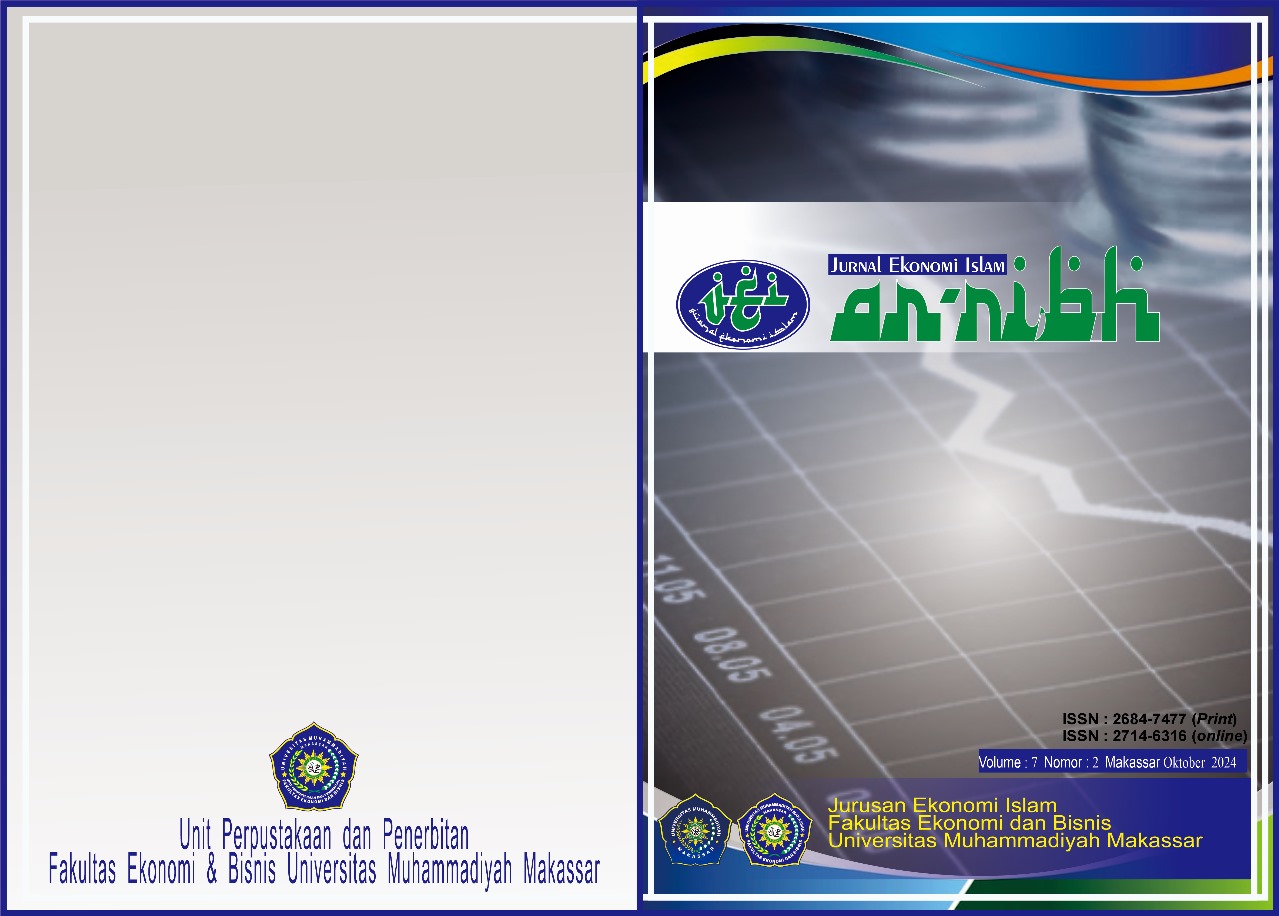Environmental Accounting in Responding to the Deforestation Crisis in Indonesia : Perspective of Maqashid Shariah and Sustainability Reporting
DOI: https://doi.org/10.26618/xyqvv313
Abstract
This study aims to examine environmental accounting disclosure through the lens of Maqashid Shariah and sustainability reporting, emphasizing the role of spiritual values, ethical intentions, and moral responsibility in corporate accountability particularly in addressing the deforestation crisis. The object of analysis is the 2024 sustainability report of PT Triputra Agro Persada Tbk, Indonesia’s largest palm oil company with a significant deforestation footprint. The findings reveal that although the company presents various narratives of environmental and social commitment, the disclosure remains largely symbolic. It lacks quantitative data, measurable indicators, and verifiable environmental impacts particularly related to carbon emissions, land degradation, and conservation costs. No evidence was found of external environmental audits or written policies to protect indigenous communities, raising concerns over potential greenwashing. From the Maqashid Shariah perspective, especially concerning hifz al-bi’ah (environmental protection) and hifz al-nafs (protection of life), the sustainability report fails to reflect a deep moral and spiritual corporate responsibility. Environmental accounting, in this context, plays a crucial role in translating Islamic values into transparent, accountable, and transformative corporate disclosures. This study highlights the urgent need for more substantive sustainability reporting frameworks that integrate Shariah ethics and ecological accountability, enabling Islamic-based corporations to pursue sustainability not only for regulatory compliance or market legitimacy, but as a form of divine stewardship (amanah ilahiyah).References
Abeysekera, I. (2022). A framework for sustainability reporting. Sustainability Accounting, Management and Policy Journal, 13(6), 1386–1409. https://doi.org/10.1108/SAMPJ-08-2021-0316
Arsad, S., Said, R., Yusoff, H., & Ahmad, R. (2022). Islamic Corporate Social Responsibility Disclosure Index: The Application of Maqasid Shari’ah and Maslahah. International Journal of Academic Research in Business and Social Sciences, 12(7). https://doi.org/10.6007/ijarbss/v12-i7/14331
Ascarya, A., & Masrifah, A. R. (2023). Developing maqasid index for Islamic CSR: the case of Ummah’s Endowment Fund in Indonesia. International Journal of Islamic and Middle Eastern Finance and Management, 16(4), 835–855. https://doi.org/10.1108/IMEFM-12-2021-0474
Auriga Nusantara. (2024). Status Deforestasi Indonesia 2024.
Azmin Shompa, Z., Akbar, M. A., & Mohd Mohadis, H. (2024). Harmonizing Maqasid al-Shari’ah with sustainable waste management practices: a conceptual framework for principles and implementation. International Journal of Islamic and Middle Eastern Finance and Management. https://doi.org/10.1108/IMEFM-02-2024-0061
Bigoni, M., & Mohammed, S. (2023). Critique is unsustainable: A polemic. Critical Perspectives on Accounting, 97. https://doi.org/10.1016/j.cpa.2023.102555
Carnegie, G. D., Gomes, D., Parker, L. D., McBride, K., & Tsahuridu, E. (2024). How accounting can shape a better world: framework, analysis and research agenda. Meditari Accountancy Research, 32(5), 1529–1555. https://doi.org/10.1108/MEDAR-06-2024-2509
Chaudhuri, R., Singh, B., Nag, B., Bhadauria, S. S., Vrontis, D., Chaudhuri, S., & Chatterjee, S. (2025). Assessing the economic and social impacts of greenwashing: moderating impact of big data analytics adoption. International Journal of Bank Marketing. https://doi.org/10.1108/IJBM-07-2024-0440
Gavrila, N., & Rusdi, F. (2020). Analisis Framing Detik.com dan Kompas.com Terhadap Pemberitaan Kualitas Udara Jakarta Terburuk di Dunia. Koneksi, 3(2), 366. https://doi.org/10.24912/kn.v3i2.6396
Gray, R., & Laughlin, R. (2012). It was 20 years ago today: Sgt Pepper, Accounting, Auditing &Accountability Journal, green accounting and the Blue Meanies. Accounting, Auditing and Accountability Journal, 25(2), 228–255. https://doi.org/10.1108/09513571211198755
Gumanti, R. (2018). Maqasid Al-Syariah Menurut Jasser Auda (Pendekatan Sistem dalam Hukum Islam) . Jurnal Al-Himayah, 2(1), 97–118.
Hadi, N., & Baihaqi, J. (2021). The motive of CSR practices in Indonesia: Maqasid al-Sharia review. Qudus International Journal of Islamic Studies, 8(2), 327–352. https://doi.org/10.21043/qijis.v8i2.8856
Hunjra, A. I., Hassan, M. K., Zaied, Y. Ben, & Managi, S. (2023). Nexus between green finance, environmental degradation, and sustainable development: Evidence from developing countries. Resources Policy, 81. https://doi.org/10.1016/j.resourpol.2023.103371
Kamaruddin, M. I. H., Zakaria, N., Mohd Hanefah, M. M., Shafii, Z., & Salleh, S. (2025). Maqasid Shariah disclosure: a case of a Malaysian Shariah-compliant company. Journal of Islamic Accounting and Business Research. https://doi.org/10.1108/JIABR-05-2024-0164
Khan, S., & Gupta, S. (2023). The interplay of sustainability, corporate green accounting and firm financial performance: a meta-analytical investigation. Sustainability Accounting, Management and Policy Journal. https://doi.org/10.1108/SAMPJ-01-2022-0016
Koleva, P. (2021). Towards the Development of an Empirical Model for Islamic Corporate Social Responsibility: Evidence from the Middle East. Journal of Business Ethics, 171(4), 789–813. https://doi.org/10.1007/s10551-020-04465-w
Kopnina, H., Zhang, S. R., Anthony, S., Hassan, A., & Maroun, W. (2024). The inclusion of biodiversity into Environmental, Social, and Governance (ESG) framework: A strategic integration of ecocentric extinction accounting. In Journal of Environmental Management (Vol. 351). Academic Press. https://doi.org/10.1016/j.jenvman.2023.119808
Laguecir, A., & Hudson, B. A. (2024). Too poor to get social housing: Accounting and structural stigmatisation of the poor. Critical Perspectives on Accounting, 100. https://doi.org/10.1016/j.cpa.2024.102757
Machado, B. A. A., Dias, L. C. P., & Fonseca, A. (2021). Transparency of materiality analysis in GRI-based sustainability reports. Corporate Social Responsibility and Environmental Management, 28(2), 570–580. https://doi.org/10.1002/csr.2066
Maroun, W., & Atkins, J. (2021). A Practical Application of Accounting for Biodiversity: The Case of Soil Health. Social and Environmental Accountability Journal, 41(1–2), 37–65. https://doi.org/10.1080/0969160X.2020.1819360
Mbatuegwu, C. D., Lawal, S., & Egberi, O. E. (2022). Impact of Environmental Accounting Disclosure on Financial Statements. World Wide Journal of Multidisciplinary Research and Development, 8, 111–120.
Mohd Zain, F. A., Wan Abdullah, W. A., Muhamad Nasir, M. N., & Hassan, M. F. (2025). Development of a comprehensive sustainability performance index for takaful operators: integrating Maqasid Al-Shariah and stakeholder perspectives. International Journal of Islamic and Middle Eastern Finance and Management. https://doi.org/10.1108/IMEFM-07-2024-0343
Osman, M., Gallhofer, S., & Haslam, J. (2021). Contextualising and critically theorising corporate social responsibility reporting: Dynamics of the late Mubarak Era in Egypt. Critical Perspectives on Accounting, 74. https://doi.org/10.1016/j.cpa.2020.102166
Reygadas, Y., Spera, S. A., & Salisbury, D. S. (2023). Effects of deforestation and forest degradation on ecosystem service indicators across the Southwestern Amazon. Ecological Indicators, 147. https://doi.org/10.1016/j.ecolind.2023.109996
Rodrigue, M., Tregidga, H., & Cooper, C. (2024). The fragments and traces of integrated reporting that prevail: On the importance of a sustained critical perspective on reporting. In Critical Perspectives on Accounting (Vol. 99). Academic Press. https://doi.org/10.1016/j.cpa.2024.102726
Roszkowska-Menkes, M., Aluchna, M., & Kamiński, B. (2024). True transparency or mere decoupling? The study of selective disclosure in sustainability reporting. Critical Perspectives on Accounting, 98. https://doi.org/10.1016/j.cpa.2023.102700
Schirato, A., Crotti, G., Proietti Zaccaria, R., Alabastri, A., & Della Valle, G. (2022). Hot carrier spatio-temporal inhomogeneities in ultrafast nanophotonics. New Journal of Physics, 24(4), 045001. https://doi.org/10.1088/1367-2630/ac6009
Shahid, A. U., Patel, C., & Pan, P. (2022). Corporate social responsibility, intrinsic religiosity, and investment decisions. Journal of Behavioral and Experimental Finance, 34. https://doi.org/10.1016/j.jbef.2022.100650
Sisaye, S., & Birnberg, J. G. (2024). The evolution of sustainability accounting and reporting in the United States: applications of the ecological anthropology and industrial ecology frameworks. Journal of Business and Socio-Economic Development. https://doi.org/10.1108/jbsed-03-2023-0020
Thomson, I. (2020). From Gray to Green Accounting. Social and Environmental Accountability Journal, 40(3), 205–208. https://doi.org/10.1080/0969160X.2020.1837640
Tregidga, H., & Laine, M. (2022). On crisis and emergency: Is it time to rethink long-term environmental accounting? Critical Perspectives on Accounting, 82. https://doi.org/10.1016/j.cpa.2021.102311
Tweedie, J. (2024). Environmental accounting: In communicating reality, do we construct reality? Critical Perspectives on Accounting, 100. https://doi.org/10.1016/j.cpa.2024.102764
Velte, P. (2023). Determinants and financial consequences of environmental performance and reporting: A literature review of European archival research. In Journal of Environmental Management (Vol. 340). Academic Press. https://doi.org/10.1016/j.jenvman.2023.117916
















